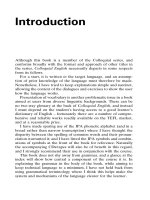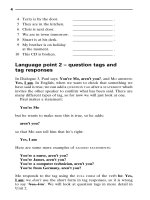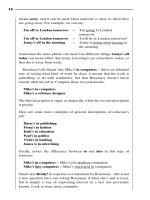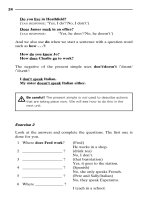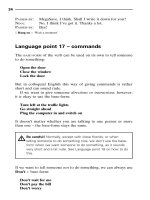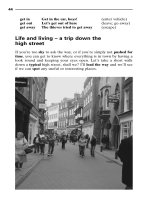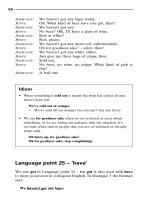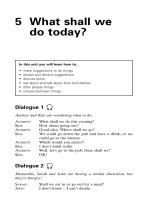Tài liệu A complete English language course part 18 ppt
Bạn đang xem bản rút gọn của tài liệu. Xem và tải ngay bản đầy đủ của tài liệu tại đây (185.39 KB, 10 trang )
Phrasal verbs
bring along – if you ask someone to bring something along, it means that
you want them to bring it with them; it’s a bit like come along (Unit 5).
drop by – ‘visit at home’; if you want to invite someone to call on you at
home next week, you can say Why don’t you drop by next week?
hand in – if we find someone’s wallet in the street and we take it to the
police station, we call this handing something in.
invite round – ‘invite to your home’.
pick up – ‘collect’. We use this phrasal verb for both things and people –
We can pick up the food on the way back; Can you pick me up from
the station?
154
10 Which do you
prefer?
In this unit you will learn how to:
• compare things
• express preferences
• compare and contrast what people do
• use adverbs of degree
Dialogue 1
Rosemary and Stuart are discussing preferences.
S
TUART
: Which do you prefer – Indian or Chinese food?
R
OSEMARY
: Well, I really like both.
[thinks for a moment]
I suppose I prefer Chinese when it’s a takeaway, but
I’d rather have Indian when I go out. What about
you?
S
TUART
: Indian is my favourite. And I don’t like Italian food
at all.
R
OSEMARY
: Neither do I.
Dialogue 2
Hannah and Natalie are trying on clothes in an expensive shop.
H
ANNAH
: What do you think of this jumper?
N
ATALIE
: You can’t afford that – it’s £60!
1111
2
3
4
5
6
7
8
9
10
11
1211
13
14
15
16
17
18
19
20
21
22
23
24
25
26
27
28
29
30
31
32
33
34
35
36
37
38
39
40
41
4211
H
ANNAH
: I know. But what do you think of it?
N
ATALIE
: I prefer the red one.
H
ANNAH
: You’re just saying that because it’s cheaper.
N
ATALIE
: No I’m not! I really think it’s better.
H
ANNAH
: That’s fine, then – you buy the cheap one, and I’ll buy
the nice one.
156
Idioms
• We use I suppose to show that we are not quite certain about the
statement we’re going to make. I suppose I prefer Chinese food
means ‘I think I prefer Chinese food, but I’m not quite sure’.
See also Language point 89.
• at all after a
NEGATIVE
verb means ‘completely’ – I don’t like
Italian food at all means ‘I really dislike Italian food’.
• favourite means ‘(the one) I like best’ – you can use it as a
NOUN
:
Curry is my favourite
or as an
ADJECTIVE
:
Curry is my favourite food
• can’t afford means ‘haven’t got enough money for . . .’
Language point 59 – comparatives and
superlatives
When we compare two things we can use the
COMPARATIVE
form of
the
ADJECTIVE
. Here are some examples:
cheap These shoes are cheaper
than those
heavy Steel is heavier
than aluminium
comfortable My new armchair is more comfortable
than
my old one
good I think brown bread is better
than white
There are two ways of forming comparatives of regular adjectives:
1 with short adjectives, we add -er (so cheap → cheaper)
1111
2
3
4
5
6
7
8
9
10
11
1211
13
14
15
16
17
18
19
20
21
22
23
24
25
26
27
28
29
30
31
32
33
34
35
36
37
38
39
40
41
4211
157
Spelling rules
• When the adjective ends in -e, we add -r:
fine → finer
blue → bluer
• When the adjective ends in a single vowel + single consonant, we
double the consonant:
big → bigg
er
hot → hott
er
• When the adjective ends in
CONSONANT
+ y, we change -y to -ier:
happy → happier
heavy → heavier
2 with longer adjectives (more than two syllables) we simply put
more before the adjective:
comfortable → more comfortable
expensive → more expensive
Notice that you can’t use -er with longer words, and you can’t use
more with short words:
comfortable → more comfortable not ‘comfortabler
’
cheap → cheaper not ‘more cheap
’
There are also some
IRREGULAR
comparatives that you simply have
to learn:
good → better
bad → worse /ws/
We use than /ðn/ ,
WEAK FORM
/ðən/, between the comparative and
the second thing compared:
London is bigger than
Paris
James is taller than
Ben
And when we compare three or more things or people, we use the
SUPERLATIVE
– you can form it directly from the
COMPARATIVE
that
we’ve just seen:
• change -er to -est: cheaper → cheapest
hotter → hottest
heavier → heaviest
• change more to most: more comfortable → most comfortable
more expensive → most expensive
• irregular: better → best
worse → worst /wst/
Unlike the comparative, the superlative is always used with the:
The blue shirt is cheaper than
the red one
The white shirt is the cheapest
(of them all)
158

